期末总复习课件(共73张PPT) 2022-2023学年外研版七年级英语上册
文档属性
| 名称 | 期末总复习课件(共73张PPT) 2022-2023学年外研版七年级英语上册 |  | |
| 格式 | pptx | ||
| 文件大小 | 4.5MB | ||
| 资源类型 | 教案 | ||
| 版本资源 | 外研版 | ||
| 科目 | 英语 | ||
| 更新时间 | 2022-12-27 08:31:03 | ||
图片预览

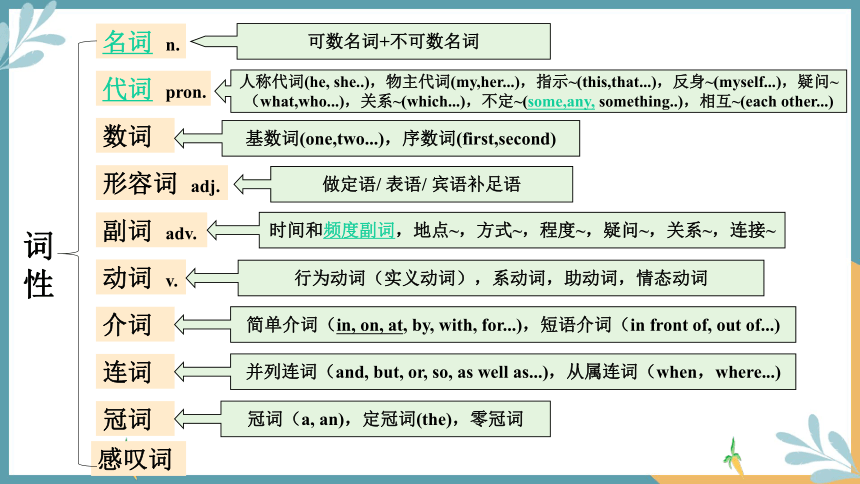
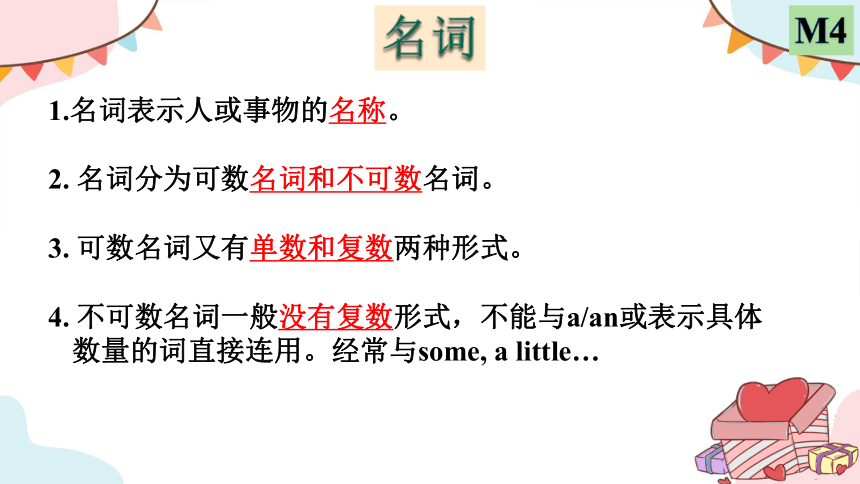
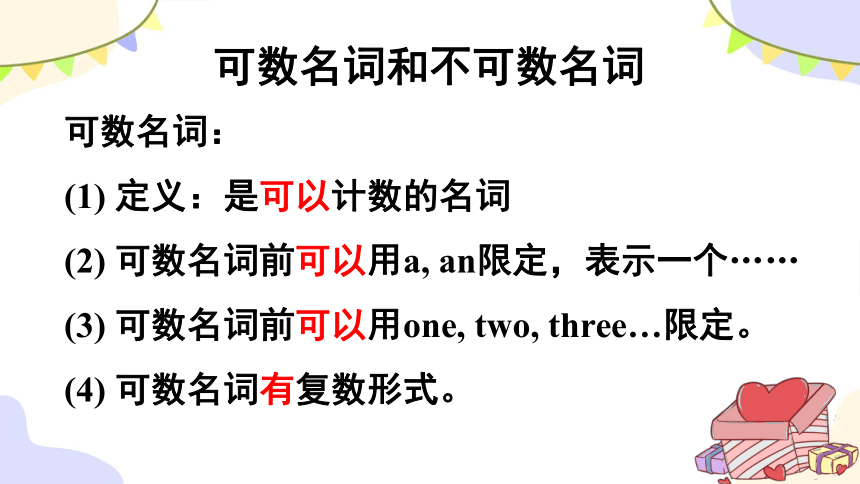
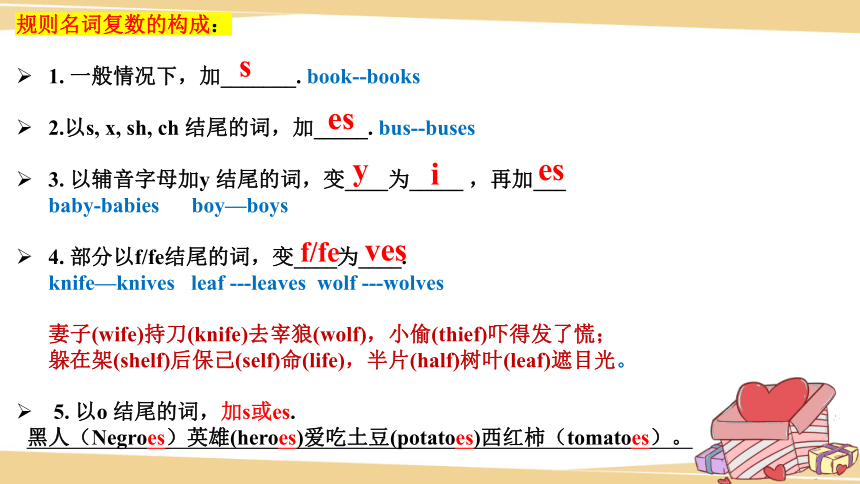
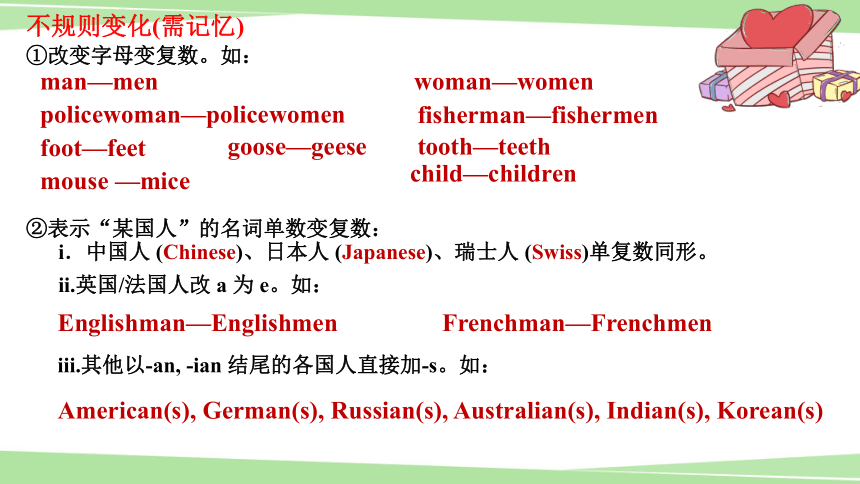
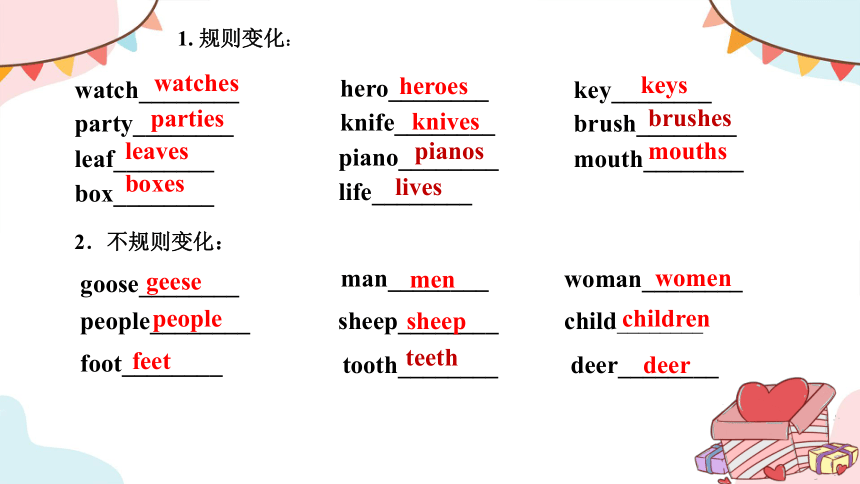
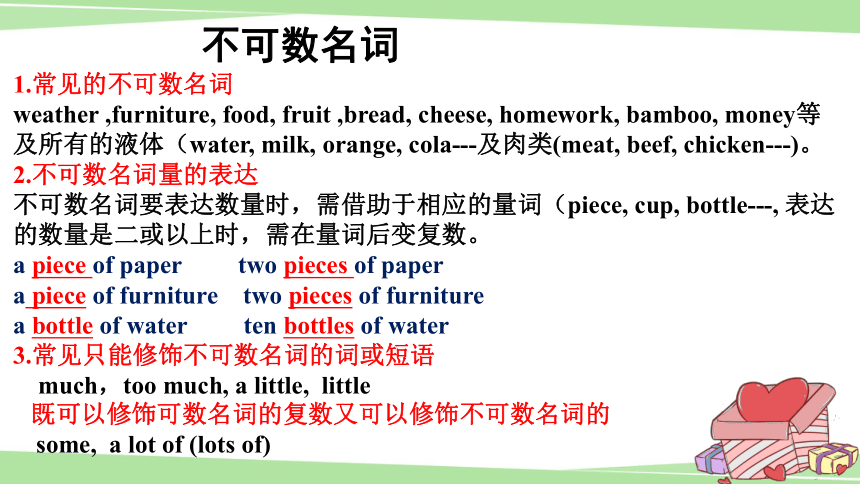
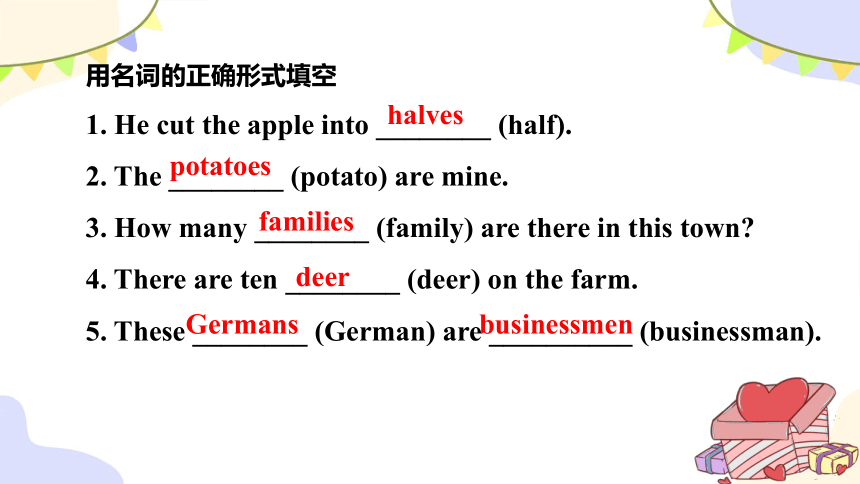
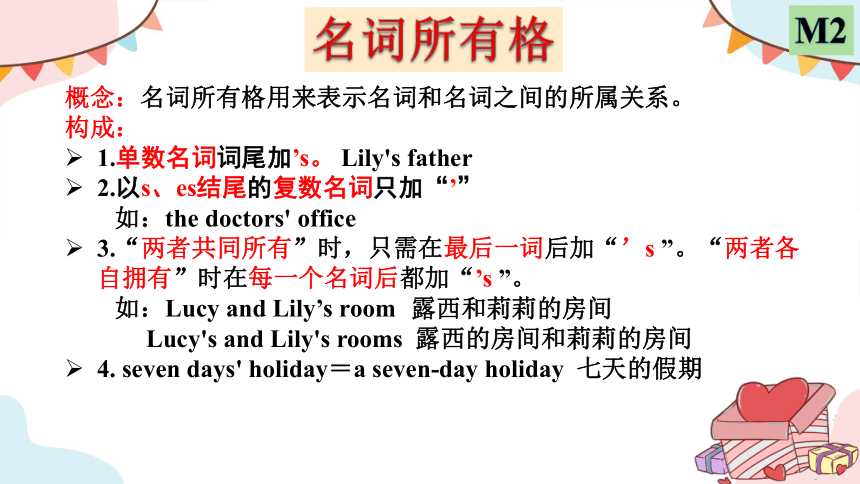
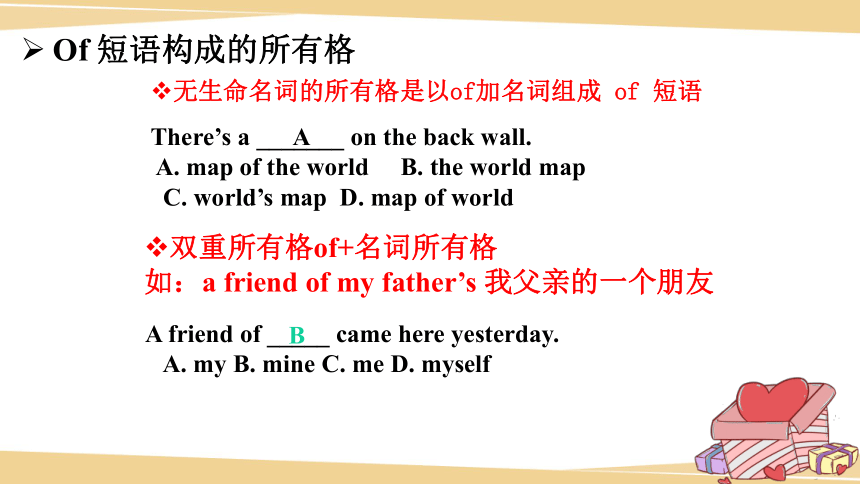
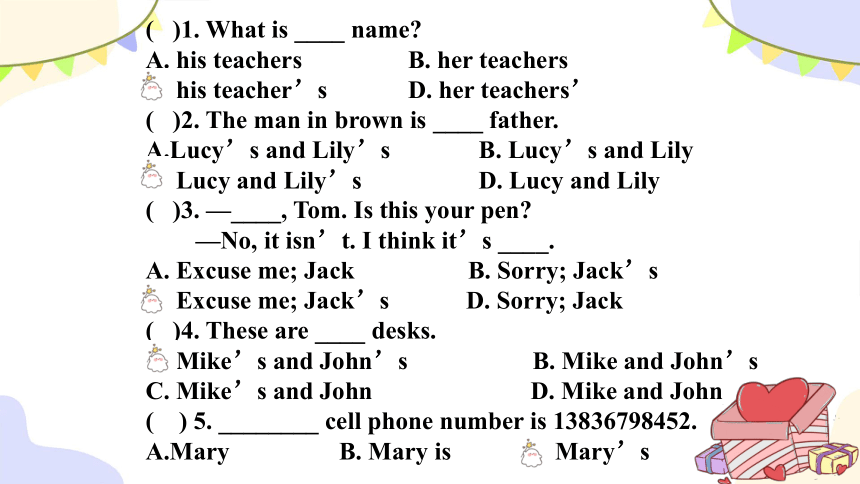
文档简介
(共73张PPT)
七年上册英语语法
复习
名词 n.
代词 pron.
数词
形容词 adj.
副词 adv.
动词 v.
介词
连词
冠词
感叹词
词
性
可数名词+不可数名词
人称代词(he, she..),物主代词(my,her...),指示~(this,that...),反身~(myself...),疑问~(what,who...),关系~(which...),不定~(some,any, something..),相互~(each other...)
基数词(one,two...),序数词(first,second)
做定语/ 表语/ 宾语补足语
时间和频度副词,地点~,方式~,程度~,疑问~,关系~,连接~
行为动词(实义动词),系动词,助动词,情态动词
简单介词(in, on, at, by, with, for...),短语介词(in front of, out of...)
并列连词(and, but, or, so, as well as...),从属连词(when,where...)
冠词(a, an),定冠词(the),零冠词
1.名词表示人或事物的名称。
2. 名词分为可数名词和不可数名词。
3. 可数名词又有单数和复数两种形式。
4. 不可数名词一般没有复数形式,不能与a/an或表示具体数量的词直接连用。经常与some, a little…
名词
M4
可数名词:
(1) 定义:是可以计数的名词
(2) 可数名词前可以用a, an限定,表示一个……
(3) 可数名词前可以用one, two, three…限定。
(4) 可数名词有复数形式。
可数名词和不可数名词
规则名词复数的构成:
1. 一般情况下,加_______. book--books
2.以s, x, sh, ch 结尾的词,加_____. bus--buses
3. 以辅音字母加y 结尾的词,变____为_____ ,再加___
baby-babies boy—boys
4. 部分以f/fe结尾的词,变____为____.
knife—knives leaf ---leaves wolf ---wolves
妻子(wife)持刀(knife)去宰狼(wolf),小偷(thief)吓得发了慌;
躲在架(shelf)后保己(self)命(life),半片(half)树叶(leaf)遮目光。
5. 以o 结尾的词,加s或es.
黑人(Negroes)英雄(heroes)爱吃土豆(potatoes)西红柿(tomatoes)。
s
es
y
i
es
f/fe
ves
不规则变化(需记忆)
①改变字母变复数。如:
man—men
woman—women
policewoman—policewomen
fisherman—fishermen
foot—feet
tooth—teeth
goose—geese
mouse —mice
child—children
②表示“某国人”的名词单数变复数:
i.中国人 (Chinese)、日本人 (Japanese)、瑞士人 (Swiss)单复数同形。
ii.英国/法国人改 a 为 e。如:
Englishman—Englishmen
Frenchman—Frenchmen
iii.其他以-an, -ian 结尾的各国人直接加-s。如:
American(s), German(s), Russian(s), Australian(s), Indian(s), Korean(s)
watches
keys
knives
brushes
leaves
key________
brush________
mouth________
watch________
party________
leaf________
box________
hero________
knife________
piano________
life________
2.不规则变化:
pianos
mouths
boxes
lives
goose________
man________
woman________
people________ sheep________
child________
foot________
tooth________
deer________
geese
men
women
people
sheep
children
feet
deer
heroes
parties
teeth
1. 规则变化:
不可数名词
1.常见的不可数名词
weather ,furniture, food, fruit ,bread, cheese, homework, bamboo, money等及所有的液体(water, milk, orange, cola---及肉类(meat, beef, chicken---)。
2.不可数名词量的表达
不可数名词要表达数量时,需借助于相应的量词(piece, cup, bottle---, 表达的数量是二或以上时,需在量词后变复数。
a piece of paper two pieces of paper
a piece of furniture two pieces of furniture
a bottle of water ten bottles of water
3.常见只能修饰不可数名词的词或短语
much,too much, a little, little
既可以修饰可数名词的复数又可以修饰不可数名词的
some, a lot of (lots of)
用名词的正确形式填空
1. He cut the apple into ________ (half).
2. The ________ (potato) are mine.
3. How many ________ (family) are there in this town
4. There are ten ________ (deer) on the farm.
5. These ________ (German) are __________ (businessman).
halves
potatoes
families
deer
Germans
businessmen
名词所有格
概念:名词所有格用来表示名词和名词之间的所属关系。
构成:
1.单数名词词尾加’s。 Lily's father
2.以s、es结尾的复数名词只加“’”
如:the doctors' office
3.“两者共同所有”时,只需在最后一词后加“’s ”。“两者各自拥有”时在每一个名词后都加“’s ”。
如:Lucy and Lily’s room
Lucy's and Lily's rooms
4. seven days' holiday=a seven-day holiday 七天的假期
露西和莉莉的房间
露西的房间和莉莉的房间
M2
?
?
?
Of 短语构成的所有格
There’s a _______ on the back wall.
A. map of the world B. the world map
C. world’s map D. map of world
A
无生命名词的所有格是以of加名词组成 of 短语
A friend of _____ came here yesterday.
A. my B. mine C. me D. myself
B
双重所有格of+名词所有格
如:a friend of my father’s 我父亲的一个朋友
( )1. What is ____ name
A. his teachers B. her teachers
C. his teacher’s D. her teachers’
( )2. The man in brown is ____ father.
A.Lucy’s and Lily’s B. Lucy’s and Lily
C. Lucy and Lily’s D. Lucy and Lily
( )3. —____, Tom. Is this your pen
—No, it isn’t. I think it’s ____.
A. Excuse me; Jack B. Sorry; Jack’s
C. Excuse me; Jack’s D. Sorry; Jack
( )4. These are ____ desks.
A. Mike’s and John’s B. Mike and John’s
C. Mike’s and John D. Mike and John
( ) 5. ________ cell phone number is 13836798452.
Mary B. Mary is C. Mary’s
人称代词
概念:人称代词是用来代替人和事物的词有人称,有数和格的变化
人称代词分为主格和宾格。
用法:主格作主语, 宾格作介词或动词的宾语。
人 称 分类 第一人称 第二人称 第三人称 单数 复数 单数 复数 单数 复数
主 格
宾 格
I
we
you
you
he
she
it
they
me
us
you
you
him
her
it
them
M2
my his her it your
yours ours theirs
mine
your
his
hers
its
our
yours
their
物主代词分形容性物主代词和名词性物主代词二种
形容性物主代词一般放在名词前作定语。
形物代+ 名词(形容词性质,不能单独用)
②名词性物主代词:=形物代+ 名词 (名词性质,可单独用)
物主代词
形容词性物主代词
名词性物主代词
人称代词主格 I you he she it we you they
人称代词宾格 me you him her it us you them
形容词性物主代词 my your his her its our your their
名词性物主代词 mine yours his hers its ours yours theirs
用法:
1.be动词、情态动词、行为动词前要用人称代词的主格。
2.动词、介词的的后面要用人称代词的宾格。
3.形容词性物主代词修饰名词,放在名词的前面。
4.名词性物主代词相当于形容词+名词,指代双方都知道的或者上文出现过的事物。
1、 人称代词有几类?
2、 人称代词的用法是:
3、 物主代词有几种?如何区别?
Try to answer
有两类:主格和宾格。
人称代词的主格在句子中作主语,人称代词的宾格在句子中作宾语。
有两种:形容词性物主代词和名词性物主代词。其中形容词性物主代词后面跟名词;名词性物主代词后面不能跟名词。
用所给的词填空
1. ________is my sister. ______name is June.
We all like ______very much. Those books are _____(she)
2. Are these ____ books.
No, they aren’t _____. _______aren’t here.(they)
3. Can you show _______(I) your book
4. It’s time for ______(they) to go home.
5.John and I are in the same school. ______go to school together.
6.______(I) have many friends. Some of_____(they)are good at English.
7. Miss Li often looks after________(she)
8.They are waiting for__________(they).
She
Her
her
hers
their
theirs
Theirs
me
them
We
I
them
her
them
指示代词
1.打电话时,询问对方或介绍自己的身份,常用 ___ 指代自己“我”,用 ______指代对方“你”
2.一定要注意当他们用做主语指物时,或者在问句中,要用______和_______回答
this
that
it
that
M2
单数 复数
指近处
指远处
this
that
these
those
Hi Sally, How are you _______(1) is my family photo. My _______(2), my brother and I are in the photo. My brother's _______(3) is Michael. He is a nice boy and I _______ (4)playing with him. He _______(5) to be an actor, and then every can see him on TV. My _______(6) is a teacher in a middle school and my mother sells ( 卖) books in a _______(7). It is Saturday today. _______(8) don't go to work. Michael and I are very happy. Now we _______(9) in the theatre on the left of my school. The theatre isn't very big, _______(10) it's very nice. Being with my family is fun (乐趣). Do you like going out with your family Yours,Cindy
This
parents
name
like
wants/hopes/wishes
father
shop
They
are
but
反身代词
表示“本人,亲自”的意思。必须与被指代的人在人称和数上保持一致。
构成:第一、二人称的反身代词是用形容词性物主代词加-self/-selves 构 成 , 第 三 人 称 的 反 身 代 词 是 用 宾 格 代 词 加-self/-selves 构成
我自己_________你自己_________ 他自己______ 她自己______ 它自己______
我们自己___________你们自己________ 他(她,它)们自己____________
myself
yourself
himself
herself
itself
ourselves
yourselves
themselves
关于反身代词,须掌握其固定结构:
enjoy oneself=have a good time (过得很愉快)
by oneself=alone (单独、独自)
help oneself to… (随便吃/喝 些...)
learn sth. by oneself =teach oneself sth. (自学)
主要与动词:enjoy, help, hurt, teach, look after,
take care of, wash, buy, dress连用,作动词宾语。
Choose the right answers.
(1) Mary is ______(my, I) sister.
(2) ______(He, Him) taught ______(our, us) English.
(3) I have a cat, _______(its, it’s) name is Dick.
(4) Tom is a friend of _______(my, mine).
(5)Kate likes ______(she\her) English teacher.
(6)-What are _____(this\ these )
- ____(These\they) are cars.
my
He
us
its
mine
her
these
They
some / any
There is some milk in the cup.
There are some students in the classroom.
I have got some nice stamps.
We haven’t got any English classmates.
Have you got any brothers
Has he got any fruit
Is there any good news today
肯定句
否定句
疑问句
可数名词
不可数名词
不定代词
M4
some 可以用于可数名词之前,也可以用于不可数名词之前。 用在肯定句 (可数名词要用复数形式) I have got some nice stamps.
any 用在疑问和否定句中 She didn’t eat any meat for dinner.
1.当说话人期待肯定回答时,some也可用于疑问句中。
eg. Are there some letters for me
2.当购物时询问销售员/主人向客人表示款待时,可在疑问句中用some。
eg.Could I have some of these apple
根据句意选择恰当的词语填空。
some, any
1. Put ________ sugar into the cup.
2. Are there ________ potatoes in the basket
3. There isn't ________ juice at home.
4. Can I have ________ fruit
some
any
any
some
1. — Can I help you, Madam
— Yes. I'd like some ______. (2020湖南邵阳中考)
A. pears B. banana C. milks
A
句型转换。(每空限填一词)
He has some good ideas.(改为否定句)(2020黑龙江绥化中考)
He ________ have ________ good ideas.
doesn’t any
频度副词
100% always 总是,一直
90% usually 通常
75% often 经常
50% sometimes 有时
0% never 从不
M8
频度副词是用来表示动作频率的词,常见的频度副词有always, usually, often, sometimes和never。
它们按频率大小排列如下:always (总是) > usually (通常) > often (经常) > sometimes (有时) > never (从不)。
频度副词通常放在be动词、助动词或情态动词之后,实义动词之前。
1. I ________ go to the theatre, because I don’t like
operas at all.
A. always B. often C. sometimes D. never
Practice
2. I ________ watch this TV programme. It’s very
interesting.
A.often B. never C.seldom D. hardly
e.g. Tom is always late for school.
Mary doesn’t often help her friends.
He can never know that.
I usually listen to music on Sunday.
对频度副词进行提问要用 how often。
e.g. I sometimes go swimming.
→How often do you go swimming
3. --________ does Tom write n letter to his parents
--Twice a month.
A. How often B.How many times C. How long
4. Meals are very boring. He ________ has the same
thing to eat every day.
A.never B. usually C. sometimes D. seldom
in,on,at
介词
M5
表达日常行为时会用到时间,用在时间前的介词(at , in, on)的用法如下:
一、at常用来表示 “在几点几分;在某一时刻”。
e.g. We start our class at eight every day.
我们每天8点开始上课。
【固定短语】
at night 在晚上
at weekends 在周末
at noon 在中午
二、on常用来表示“在某天或星期几”。另外,表示“在某天的上、下午或晚上”时,介词也用on。
e.g. on Sunday 在星期天
on February 8th 在二月八日
on Monday morning 在星期一上午
on the afternoon of November 21st
在十一月二十一日下午
on a cold winter evening 在一个寒冷的冬夜
三、in表示“在某一段时间”,如某年、某月、某个季节。
e.g. in 2017 在2017年
in March 在三月
in summer 在夏天
【固定短语】
in the morning in the evening
in the day in the middle of the day
at
①at +具体时刻、固定搭配
②on +具体某一天(星期/日期)、具体某一天的上午/下 午/ 晚上
③in +季节、月份、年份、世纪、上/下午/晚上
summary
1. They have an English lesson ____ three o’clock ____ Tuesday.
A. at; on B. in; on C. at; in
2. — What time do you usually have your first class
— ______ eight o’clock _____ the morning.
A. At, on B. At, in C. On, in
3. We have art _______ the afternoon of Thursday.
A. in B. at C. on D. /
4.We arrived in Beijing ______ the morning of October 1st.
A. in B. on C. at D. during
5. Ann helps Lily with her homework ___eight o’clock ___Sunday.
A. on; in B. in; on C. at; on D. on; on
三、时间表达法
表达整点:基数词+o’clock
如:8:00 (eight o’clock)
表达几点几分的顺读法:先说整点再说分钟
如:8:10(eight ten)
表达几点几分的逆读法:
(1)<或=30分钟,用分钟数+past+整点数
如:8:10(ten past eight)
(2)>30分钟,用(60-分钟数)+to+下一个整点数
如:8:50( ten to nine)
注意:30分钟,一般用half (8:30 half past eight)
15分钟,一般用quarter (8:15 a quarter past eight)
行为动词的一般现在时(1);in/on/at表示时间的区别;时间表达法
请写出下列时间
12:05 2. 8:20 3. 9:30
4. 10:15 5. 7:52 6. 11:55
6:00 8. 7:00
twelve five
five past twelve
eight twenty
twenty past eight
nine thirty
half past nine
ten fifteen
a quarter past ten
seven fifty-two
eight to eight
eleven fifty-five
five to twelve
six o’clock
seven o’clock
名词 n.
代词 pron.
数词
形容词 adj.
副词 adv.
动词 v.
介词
连词
冠词
感叹词
词
性
可数名词+不可数名词
人称代词(he, she..),物主代词(my,her...),指示~(this,that...),反身~(myself...),疑问~(what,who...),关系~(which...),不定~(some,any, something..),相互~(each other...)
基数词(one,two...),序数词(first,second)
做定语/ 表语/ 宾语补足语
时间和频度副词,地点~,方式~,程度~,疑问~,关系~,连接~
行为动词(实义动词),系动词,助动词,情态动词
简单介词(in, on, at, by, with, for...),短语介词(in front of, out of...)
并列连词(and, but, or, so, as well as...),从属连词(when,where...)
冠词(a, an),定冠词(the),零冠词
and 表示“和,又,与,并”,连接两个名词、动词或句子,表示并列关系。
or 用于否定句表示“和”的意思,用于疑问句中表示“还是,或者”的意思。
but “但是,而是”,表转折关系。
so 因此,所以;因而,从而, 表因果关系
because “因为”,不可和so连用,表因果关系
M4
【语境应用】用and, but, or 完成下列句子。
1) Mr. Zhang is an English teacher _____ he teaches us English.
2) Do you like to have Chinese food _____ western food
3) He is rich, ______ he isn’t happy.
4) Have you got any brothers ______ sisters
5) Juice ______ milk are healthy drinks _____ cola isn’t a healthy drink.
6) Remember to eat noodles ______ rice, not hamburgers.
or
and
but
or
or
but
and
一般现在时
概念: 经常、反复发生的动作或行为及现在的某种
状况.客观存在或普遍真理
时间状语: always, usually, often, sometimes, every week (day, year, month…), once a week, on Sundays
基本结构:① be 动词;②实义动词
1.be 动词的一般现在时的句式:
肯定形式: 主语+am/is / are + 其它
否定形式:主语+am/is/are+not;
一般疑问句:把 be 动词放于句首;
肯定及否定回答: Yes, 主语+am/is/are.
No, 主语+isn’t/aren’t.
Be动词顺口溜:
我用am你用are, is 跟着他她它
单数名词用is, 复数名词都用are.
变疑问,be 提前。变否定,be 后直接加not.
思考:Yes, I’m. (T or F) No, I’m not. (Tor F)
2.实义动词的一般现在时句式:
否定形式: A.主语不是三单式,则 主+don't+动词原形
B.主语为三单式,则 主+doesn‘t+动词原形。
一般疑问句:A.主语不是三单式,用助动词 Do+主语+动词原形
B.主语为三单式,则Does+主语+动词原形
一般现在时态顺口溜:
一般现在时,表示经常发生事,肯定直接加原形,否定don’t 加原形。疑问用do 打头阵。
三单s, es, 否定doesn’t 加原形,疑问does在前面,切记三单要还原。
思考: 助动词do ,does, don’t, doesn’t 什么情况下使用?
Do you know
动词三单的变化:
1、一般动词后加____,如:reads,plays,works,makes
2、以 s,x,ch,sh, 结尾,后加____. 如:watches,
3、以辅音字母加o结尾,一般加____ ,如:does,goes
4、辅音字母+y结尾的单词,去y,加____,如:worries
studies
s
es
es
ies
用所给动词的正确形式填空:
1.She ______ a teacher.Her name _____ WangLi(be)
2..We often ______(play) in the playground.
2.She often __________(watch) TV with her dog.
3.The earth ______(go) around the sun.
4.My mother _______look) after my sister at home.
5. Lucy ________(have) some friends here.
6.Fang Ming _____________(not like )rice at all.
7. ________ Mike________(read) English every day
8. _____you ______(brush) your teeth every morning.
9. What (do) ______he usually (do)______ after school
10.The picture ______(look) nice.
play
watches
looks
doesn’t like
has
goes
is
is
Does
read
Do
brush
does
do
looks
Ⅰ. 根据语境从括号内选择恰当的词语填空。
1. In summer, he usually ________(drink / drinks) juice.
2. The theatre ________(close / closes) at 1:00 am.
3. My parents ________(don't / doesn't) work on Sundays.
4. I ________(have / has) a computer. It ________(work / works) well.
5. Emma ________(don't / doesn't) know her teacher's telephone number.
drinks
closes
don't
have
doesn't
works
Ⅱ. 根据括号内的要求完成下列各题,每空一词(含缩略形式)。
1. Bob does his homework in class. (改为否定句)
Bob ________ ________ his homework in class.
2. She has a new bag. (改为一般疑问句)
________ she ________ a new bag
3. Liu Mei draws very well. (改为一般疑问句,并补全肯定和否定答语)
—________ Liu Mei ________ very well
—Yes, ________ ________. / No, ________ ________.
doesn't do
Does have
Does draw
she does she doesn't
4. The giraffe is tall and strong. (对划线部分提问)
________ ________ the giraffe ________
5. The bear eats meat and plants. (改为同义句)
The bear eats meat ________ ________ ________ plants.
What is like
as well as
句型转换:
Do you often play football after school (肯定回答)
2. I have many books. (改为否定句)
I _____ _____ many books.
3.Gao Shan’s sister likes playing table tennis (改为否定句)
Gao shan’s sister _____ _____ playing table tennis.
4.She lives in a small town near New York. (改为一般疑问句
_____ she _____ in a small town near New York
5.I watch TV every day. (改为否定句)
I ____ _____ TV every day.
Yes, I do.
don’t
have
doesn’t
like
Does
live
don’t
watch
1._____ you have a book
A Do B. Are C. Is D. Have
2.Does Li Lei like to watch TV ______________.
A. Yes, he like. B. No, he doesn’t .
C. Yes, he’d like. D. No, he likes.
3.She doesn’t ______ her homework in the afternoon.
A. doing B. to do C. does D. do
4.How ____ Mr. Smith ______ to England
A. do, go B. is , go
C. does, go D. does , goes
5.Do they have a new car Yes,_____.
A.they are B.they have
C.they don't D.they do
1. 结构:be+doing
be (am/is/are) 随着人称、数的变化而变化。
2. 意义:正在发生的事情。
现在进行时
3. 现在进行时的肯定句和否定句结构
1) 肯定句:主语+be+动词-ing+ …
2) 否定句:主语+be+not+动词-ing + …
be动词随着主语单复数的变化而变化;is和are与not可以缩写为isn’t和aren’t,am与not不缩写。
4. 动词-ing变化形式:
1) 动词后直接加-ing:
do → doing buy → buying
2) 以e结尾的动词去e加-ing:
have → having take→ taking
3) 以辅+元+辅的重读闭音节结尾的单词, 双写最后
一个字母, 然后加-ing:
run→ running swim → swimming
4) 特殊形式:lie → lying
5. 常与现在进行时态连用的词: now, at this moment,
right now, listen, look等。
e.g. I’m reading now.
Listen! She is singing.
Look! My parents are watering the flowers.
Ⅰ. 根据括号内的要求完成下列各题,每空一词(含缩略
形式)。
1. I am sleeping on the sofa. (改为否定句)
________ ________ ________ on the sofa.
2. Betty is sending email on the computer. (改为否定句)
Betty ________ ________ email on the computer.
3. They are wearing green T-shirts. (改为一般疑问句)
________ they ________ green T-shirts
I’m not sleeping
isn’t sending
Are wearing
4. Mr Brown often prints some documents. (改为现在进行
时)
Mr Brown ________ ________ some documents.
5. My brother is reading in the library at this moment.
(改为同义句)
My brother is reading in the library ________ ________.
is printing
right now
一般现在时与现在进行时的对比
现在进行时 一般现在时
表示说话时正在发生或者进行的动作。
谓语为:be (am / is / are) +v.-ing 形式。
常与now, at the moment等时间状语连用。Look和Listen也是明显标志。
表示经常性、习惯性的动作或表示主语现在的身份、特征或状态
谓语通常为:be动词(am / is / are),行为动词原形或第三人称单数形式;
常与always, usually, often, sometimes, never, every day, on Sundays以及表示频率的词语等连用
there be... 某处有某人(物)
There be 句型
①肯定句:There be (is/ are) + 名词 +地点.
②否定句:There be + not + 名词 +地点.
③一般疑问句:Be + there + 名词 +地点
Yes, there be.
/ No, there be + not.
④特殊疑问句:疑问词 + 一般疑问句?
主语+ have/ has got+其他. 某人有某人/ 某物
have/ has got的用法
①肯定结构:
主语+have / has got+其他.
②否定结构:
主语+have / has not got +其他.
(have not = haven't; has not = hasn't)
③疑问及答语结构:
Have / Has+主语+got+其他
Yes, 主语+have / has.
No, 主语+haven't / hasn't.
have not 缩写haven’t
has not 缩写hasn’t
根据语境用have got, has got, haven’t got或hasn’t got填空。
1. Sarah ____________ a car. She goes to work by bike.
2. They like dogs. They ________ three dogs.
3. Charles is happy. He ________ a new pen.
hasn't got
have got
has got
4. They don't read much. They _____________ many books.
5. Julia wants to play football but she _____________ a football.
haven't got
hasn't got
含义 关系
have/has got
there be
I have got a new book.
There is a new book on the desk.
She has got a lot of friends.
There are a lot of friends in the meeting room.
我有一本新书。
桌子上有一本新书。
她有很多朋友。
会议室里有很多朋友。
存在关系
所属关系
某人(拥)有
某地有某人或某物
请根据句意用there be 或have got的适当形式填空,每空词
数不限。
1. Bill _________ a big family.
2. _________ a gym behind the library.
3. ___________ some students and a teacher in the classroom.
4. _______ you _______ any brothers or sisters
5. —How many books _______ Bill _______
—He _______ three.
6. _________ a map and two pictures on the wall.
has got
There is
There are
Have got
has got
There is
has got
1. ___ _____ any bread in the box
2. She ____ ____ a nice kite.
3. Under the tree, _____ _____ some
women drinking tea.
4. _____ _____ any cakes in your bag
5. ______ you ____ a white shirt
Is there
has got
there are
Are there
Have got
用 there be/have (has) got 的正确形式填空。
固定短语搭配
1. It’s time to do sth. /It’s time for sth. 是时候....
2. Let sb do sth. Let’s do sth. 让我们...
3. What /How about doing sth ...怎么样?
4. Thank you /Thanks for (doing) sth. 感谢...
5.It’s 形容词 (for sb.) to do sth. 做某事是...的
6. spend time/money (in) doing sth.
spend time/money on sth.花费时间/金钱在...
7.help sb (to)do sth =help sb with sth 帮助...做...
8. like doing sth/ like to do sth. 喜欢做...
9. enjoy doing sth. 享受做...
固定短语搭配
11. would like to do sth.=want to do sth.
=feel like doing sth.想要做...
12. be busy doing sth=be busy with sth.忙于做...
13. remember to do sth.记得要去做...
14.use sth to do sth.用...去做...
15. be good at(doing)sth=do well in (doing) sth.
擅长做...
用括号中所给词的正确形式填空。
1.We can’t spend too much time_________( play) computer games.
2. Tony likes _________________ (run) a lot.
3. My sister usually _______ (help) my mother ________ (do) some housework
4. Daming enjoys ________(take) photos of his family.
5. The tigers are good at ___________ (swim).
6.Thank you for ________ (give) me the presents.
7.It’s time ________ (have) lunch.
8.How about ________ (go) _________(shop) at weekends.
9. Would you like ________ (visit) the Great Wall this winter holiday
10. I want ________ (learn) English well.
11. Look! My grandma is busy ________ (make) lanterns.
13. Remember ________ (buy) some fruit for me.
14. Many students use the Internet ________ (write ) their homework.
15. Let’s _______ (sweep) the floor.
playing
running / to run
helps
do/to do
taking
swimming
giving
to have
going
shopping
to visit
to learn
making
to buy
to write
sweep
接双宾语的动词
1. give sb. sth =give sth to sb 把...给...
2. send sb. sth=send sth to sb 送某人...
3. make sb. sth= make sth for sb 为某人做...
4. cook sb. sth= cook sth for sb 为某人煮...
5. choose sb. sth=choose sth for sb. 为某人选择...
6. buy sb. sth=buy sth for sb 买...给某人
小试牛刀
一、把下列句子改写成同义句。
1. My friend sends me an emai.
My friend sends ___ _____ __ ___.
2. Betty’s mother often buys her some books.
Betty’s mother often _____ _____ _____ ___ ____.
二、选择题。
1. He always gives cards _____ his teachers on Teachers’ Day.
A. for B. to C. with
2. On my birthday, my sister always makes a big birthday cake ____ me.
A. with B. to C. for
an email to me
buys some books for her
B
C
用正确的介词进行填空。(on, in, at, for, with, from, to, of, and 等)
1.Healthy food is good ___ our health.
2. My father usually gets up ____ six o’clock.
3. Thank you ____ your email.
4. I share the computer ____ my parents.
5. Betty sometimes have an egg and some bread _____ breakfast.
6.Let me take a photo _____ you.
7.There is a big playground ____ the middle of our school.
8. Spring Festival usually comes ______ February.
9.Gao Yan sits ________Daming and Zhao Feng.
10. I often help my mother _____ housework.
11.Children like swimming in the river _____ summer.
12. She was born (出生)______ a cold morning.
13.Tony is _____ the right of Betty.
14.Her uncle works ______ a farm.
15. Look! They are playing _____ the playground.
16.What would you like _____ your birthday
17.What’s the weather _____ in winter
18. Does he like to listen ______ music
19. My father is busy _____ his work. He is still ______ work.
20. I go to school ______ weekdays.
for
at
for
for
of
in
in
between
with
with
on
on
on
on/in
for
like
to
with
at
on
in
请选出正确答案。
( )1. This is our classroom building _____ twenty-four classrooms.
A. and B. with C. in
( ) 2. Tom is ___ me, and there is a blackboard _____ the classroom.
A. in front; in the front of B. in the front of; in front of
C. in front of ; in the front of
( ) 3. What’s the weather_____ in London
A. like B. / C. likes
( ) 4. Eggs are good _____ our eyes but cola is bad ___ our health.
A. at; for B. for; for C. for ; in
( ) 5. He does well _____ English and I’m good ____ Chinese.
A. at; for B. in; at C. at ; in
( ) 6. Lucy is _____ the right of me and I’m _____ the left of Lucy.
A. on; to B. at; at C. on; on
B
A
A
B
B
C
1.what about...=how about ...(名词/代词、doing)...怎么样?
休息一会怎么样啊?_________________________________
这个剧院怎么样?____________________________
---Who will be our maths teacher ---____________________(刘老师怎么样?)
2.it's time to do sth. 到时间做某事了
It's sunday to go swimming.
到上英语课的时间了。_____________________________
It is Tom's first day __________(study) English.
3.let sb. do 让某人做某事
让我们放学后去踢足球。________________________________
让我把它写在黑板上。________________________________
让我们友好相处。__________________________________
What about taking/having a rest
What about this theatre
What about Mr. Liu
It's time to have English class
to study
Let's paly football after school.
Let me write it on the blackboard.
Let's get on well with each other.
Summary
4.感叹句:What+名词+主谓! How+adj.+主谓!
好大的一个家庭啊!_______________________________________________________
好美的剧院!____________________________________________________________
5.there is/are +某物/人+地点 表示某地方有某物
我家里有4口人。___________________________________________________
公交车站有20辆公交车。_____________________________
6.提问天气:
7.提问职业:
8.like doing
What a big family (it is)!
How big the family is!
What a beautiful theatre (it is)!
How beautiful the theatre is!
There are four people in my family.
There are twenty buses at the bus station.
①What's the weather like today.
②How's the weather today
He likes playing football.
①What does your father do
②What's your father
③What's your father's job
他喜欢踢足球。
我爱好画画和听音乐。
I like drawing and listening to music.
二次过关
1.用括号内所给单词的适当形式填空
1. They live in different big_________(city).
2. It's Tom's first day_________(study) English
3. Mrs Li helps________(I) with my Chinese.
4. What about________(play) basketball or football at weekends.
5. Everyone _________(love) to have a trip there.
6._________(I)name is Wang Lin. What about you
7. Tony is from_____________(English).
8. Wang Bin, Li Yu and Zhang Hua are all from_______( Chinese).
9. Everyone_________(be) here today.
10. Tony, Jack and Ben are__________(America) .
cities
to study
me
playing
loves
My
England
China
is
American
Americans
hear 与 listen
hear 听见 强调听的结果,不一定是有意识地听
listen 听 强调有意识地听的动作,但不一定听得到;如果后边跟宾语必须与介词to 连用
e.g. I can’t hear you.
Listen! The girl is singing.
I often listen to music after school.
七年上册英语语法
复习
名词 n.
代词 pron.
数词
形容词 adj.
副词 adv.
动词 v.
介词
连词
冠词
感叹词
词
性
可数名词+不可数名词
人称代词(he, she..),物主代词(my,her...),指示~(this,that...),反身~(myself...),疑问~(what,who...),关系~(which...),不定~(some,any, something..),相互~(each other...)
基数词(one,two...),序数词(first,second)
做定语/ 表语/ 宾语补足语
时间和频度副词,地点~,方式~,程度~,疑问~,关系~,连接~
行为动词(实义动词),系动词,助动词,情态动词
简单介词(in, on, at, by, with, for...),短语介词(in front of, out of...)
并列连词(and, but, or, so, as well as...),从属连词(when,where...)
冠词(a, an),定冠词(the),零冠词
1.名词表示人或事物的名称。
2. 名词分为可数名词和不可数名词。
3. 可数名词又有单数和复数两种形式。
4. 不可数名词一般没有复数形式,不能与a/an或表示具体数量的词直接连用。经常与some, a little…
名词
M4
可数名词:
(1) 定义:是可以计数的名词
(2) 可数名词前可以用a, an限定,表示一个……
(3) 可数名词前可以用one, two, three…限定。
(4) 可数名词有复数形式。
可数名词和不可数名词
规则名词复数的构成:
1. 一般情况下,加_______. book--books
2.以s, x, sh, ch 结尾的词,加_____. bus--buses
3. 以辅音字母加y 结尾的词,变____为_____ ,再加___
baby-babies boy—boys
4. 部分以f/fe结尾的词,变____为____.
knife—knives leaf ---leaves wolf ---wolves
妻子(wife)持刀(knife)去宰狼(wolf),小偷(thief)吓得发了慌;
躲在架(shelf)后保己(self)命(life),半片(half)树叶(leaf)遮目光。
5. 以o 结尾的词,加s或es.
黑人(Negroes)英雄(heroes)爱吃土豆(potatoes)西红柿(tomatoes)。
s
es
y
i
es
f/fe
ves
不规则变化(需记忆)
①改变字母变复数。如:
man—men
woman—women
policewoman—policewomen
fisherman—fishermen
foot—feet
tooth—teeth
goose—geese
mouse —mice
child—children
②表示“某国人”的名词单数变复数:
i.中国人 (Chinese)、日本人 (Japanese)、瑞士人 (Swiss)单复数同形。
ii.英国/法国人改 a 为 e。如:
Englishman—Englishmen
Frenchman—Frenchmen
iii.其他以-an, -ian 结尾的各国人直接加-s。如:
American(s), German(s), Russian(s), Australian(s), Indian(s), Korean(s)
watches
keys
knives
brushes
leaves
key________
brush________
mouth________
watch________
party________
leaf________
box________
hero________
knife________
piano________
life________
2.不规则变化:
pianos
mouths
boxes
lives
goose________
man________
woman________
people________ sheep________
child________
foot________
tooth________
deer________
geese
men
women
people
sheep
children
feet
deer
heroes
parties
teeth
1. 规则变化:
不可数名词
1.常见的不可数名词
weather ,furniture, food, fruit ,bread, cheese, homework, bamboo, money等及所有的液体(water, milk, orange, cola---及肉类(meat, beef, chicken---)。
2.不可数名词量的表达
不可数名词要表达数量时,需借助于相应的量词(piece, cup, bottle---, 表达的数量是二或以上时,需在量词后变复数。
a piece of paper two pieces of paper
a piece of furniture two pieces of furniture
a bottle of water ten bottles of water
3.常见只能修饰不可数名词的词或短语
much,too much, a little, little
既可以修饰可数名词的复数又可以修饰不可数名词的
some, a lot of (lots of)
用名词的正确形式填空
1. He cut the apple into ________ (half).
2. The ________ (potato) are mine.
3. How many ________ (family) are there in this town
4. There are ten ________ (deer) on the farm.
5. These ________ (German) are __________ (businessman).
halves
potatoes
families
deer
Germans
businessmen
名词所有格
概念:名词所有格用来表示名词和名词之间的所属关系。
构成:
1.单数名词词尾加’s。 Lily's father
2.以s、es结尾的复数名词只加“’”
如:the doctors' office
3.“两者共同所有”时,只需在最后一词后加“’s ”。“两者各自拥有”时在每一个名词后都加“’s ”。
如:Lucy and Lily’s room
Lucy's and Lily's rooms
4. seven days' holiday=a seven-day holiday 七天的假期
露西和莉莉的房间
露西的房间和莉莉的房间
M2
?
?
?
Of 短语构成的所有格
There’s a _______ on the back wall.
A. map of the world B. the world map
C. world’s map D. map of world
A
无生命名词的所有格是以of加名词组成 of 短语
A friend of _____ came here yesterday.
A. my B. mine C. me D. myself
B
双重所有格of+名词所有格
如:a friend of my father’s 我父亲的一个朋友
( )1. What is ____ name
A. his teachers B. her teachers
C. his teacher’s D. her teachers’
( )2. The man in brown is ____ father.
A.Lucy’s and Lily’s B. Lucy’s and Lily
C. Lucy and Lily’s D. Lucy and Lily
( )3. —____, Tom. Is this your pen
—No, it isn’t. I think it’s ____.
A. Excuse me; Jack B. Sorry; Jack’s
C. Excuse me; Jack’s D. Sorry; Jack
( )4. These are ____ desks.
A. Mike’s and John’s B. Mike and John’s
C. Mike’s and John D. Mike and John
( ) 5. ________ cell phone number is 13836798452.
Mary B. Mary is C. Mary’s
人称代词
概念:人称代词是用来代替人和事物的词有人称,有数和格的变化
人称代词分为主格和宾格。
用法:主格作主语, 宾格作介词或动词的宾语。
人 称 分类 第一人称 第二人称 第三人称 单数 复数 单数 复数 单数 复数
主 格
宾 格
I
we
you
you
he
she
it
they
me
us
you
you
him
her
it
them
M2
my his her it your
yours ours theirs
mine
your
his
hers
its
our
yours
their
物主代词分形容性物主代词和名词性物主代词二种
形容性物主代词一般放在名词前作定语。
形物代+ 名词(形容词性质,不能单独用)
②名词性物主代词:=形物代+ 名词 (名词性质,可单独用)
物主代词
形容词性物主代词
名词性物主代词
人称代词主格 I you he she it we you they
人称代词宾格 me you him her it us you them
形容词性物主代词 my your his her its our your their
名词性物主代词 mine yours his hers its ours yours theirs
用法:
1.be动词、情态动词、行为动词前要用人称代词的主格。
2.动词、介词的的后面要用人称代词的宾格。
3.形容词性物主代词修饰名词,放在名词的前面。
4.名词性物主代词相当于形容词+名词,指代双方都知道的或者上文出现过的事物。
1、 人称代词有几类?
2、 人称代词的用法是:
3、 物主代词有几种?如何区别?
Try to answer
有两类:主格和宾格。
人称代词的主格在句子中作主语,人称代词的宾格在句子中作宾语。
有两种:形容词性物主代词和名词性物主代词。其中形容词性物主代词后面跟名词;名词性物主代词后面不能跟名词。
用所给的词填空
1. ________is my sister. ______name is June.
We all like ______very much. Those books are _____(she)
2. Are these ____ books.
No, they aren’t _____. _______aren’t here.(they)
3. Can you show _______(I) your book
4. It’s time for ______(they) to go home.
5.John and I are in the same school. ______go to school together.
6.______(I) have many friends. Some of_____(they)are good at English.
7. Miss Li often looks after________(she)
8.They are waiting for__________(they).
She
Her
her
hers
their
theirs
Theirs
me
them
We
I
them
her
them
指示代词
1.打电话时,询问对方或介绍自己的身份,常用 ___ 指代自己“我”,用 ______指代对方“你”
2.一定要注意当他们用做主语指物时,或者在问句中,要用______和_______回答
this
that
it
that
M2
单数 复数
指近处
指远处
this
that
these
those
Hi Sally, How are you _______(1) is my family photo. My _______(2), my brother and I are in the photo. My brother's _______(3) is Michael. He is a nice boy and I _______ (4)playing with him. He _______(5) to be an actor, and then every can see him on TV. My _______(6) is a teacher in a middle school and my mother sells ( 卖) books in a _______(7). It is Saturday today. _______(8) don't go to work. Michael and I are very happy. Now we _______(9) in the theatre on the left of my school. The theatre isn't very big, _______(10) it's very nice. Being with my family is fun (乐趣). Do you like going out with your family Yours,Cindy
This
parents
name
like
wants/hopes/wishes
father
shop
They
are
but
反身代词
表示“本人,亲自”的意思。必须与被指代的人在人称和数上保持一致。
构成:第一、二人称的反身代词是用形容词性物主代词加-self/-selves 构 成 , 第 三 人 称 的 反 身 代 词 是 用 宾 格 代 词 加-self/-selves 构成
我自己_________你自己_________ 他自己______ 她自己______ 它自己______
我们自己___________你们自己________ 他(她,它)们自己____________
myself
yourself
himself
herself
itself
ourselves
yourselves
themselves
关于反身代词,须掌握其固定结构:
enjoy oneself=have a good time (过得很愉快)
by oneself=alone (单独、独自)
help oneself to… (随便吃/喝 些...)
learn sth. by oneself =teach oneself sth. (自学)
主要与动词:enjoy, help, hurt, teach, look after,
take care of, wash, buy, dress连用,作动词宾语。
Choose the right answers.
(1) Mary is ______(my, I) sister.
(2) ______(He, Him) taught ______(our, us) English.
(3) I have a cat, _______(its, it’s) name is Dick.
(4) Tom is a friend of _______(my, mine).
(5)Kate likes ______(she\her) English teacher.
(6)-What are _____(this\ these )
- ____(These\they) are cars.
my
He
us
its
mine
her
these
They
some / any
There is some milk in the cup.
There are some students in the classroom.
I have got some nice stamps.
We haven’t got any English classmates.
Have you got any brothers
Has he got any fruit
Is there any good news today
肯定句
否定句
疑问句
可数名词
不可数名词
不定代词
M4
some 可以用于可数名词之前,也可以用于不可数名词之前。 用在肯定句 (可数名词要用复数形式) I have got some nice stamps.
any 用在疑问和否定句中 She didn’t eat any meat for dinner.
1.当说话人期待肯定回答时,some也可用于疑问句中。
eg. Are there some letters for me
2.当购物时询问销售员/主人向客人表示款待时,可在疑问句中用some。
eg.Could I have some of these apple
根据句意选择恰当的词语填空。
some, any
1. Put ________ sugar into the cup.
2. Are there ________ potatoes in the basket
3. There isn't ________ juice at home.
4. Can I have ________ fruit
some
any
any
some
1. — Can I help you, Madam
— Yes. I'd like some ______. (2020湖南邵阳中考)
A. pears B. banana C. milks
A
句型转换。(每空限填一词)
He has some good ideas.(改为否定句)(2020黑龙江绥化中考)
He ________ have ________ good ideas.
doesn’t any
频度副词
100% always 总是,一直
90% usually 通常
75% often 经常
50% sometimes 有时
0% never 从不
M8
频度副词是用来表示动作频率的词,常见的频度副词有always, usually, often, sometimes和never。
它们按频率大小排列如下:always (总是) > usually (通常) > often (经常) > sometimes (有时) > never (从不)。
频度副词通常放在be动词、助动词或情态动词之后,实义动词之前。
1. I ________ go to the theatre, because I don’t like
operas at all.
A. always B. often C. sometimes D. never
Practice
2. I ________ watch this TV programme. It’s very
interesting.
A.often B. never C.seldom D. hardly
e.g. Tom is always late for school.
Mary doesn’t often help her friends.
He can never know that.
I usually listen to music on Sunday.
对频度副词进行提问要用 how often。
e.g. I sometimes go swimming.
→How often do you go swimming
3. --________ does Tom write n letter to his parents
--Twice a month.
A. How often B.How many times C. How long
4. Meals are very boring. He ________ has the same
thing to eat every day.
A.never B. usually C. sometimes D. seldom
in,on,at
介词
M5
表达日常行为时会用到时间,用在时间前的介词(at , in, on)的用法如下:
一、at常用来表示 “在几点几分;在某一时刻”。
e.g. We start our class at eight every day.
我们每天8点开始上课。
【固定短语】
at night 在晚上
at weekends 在周末
at noon 在中午
二、on常用来表示“在某天或星期几”。另外,表示“在某天的上、下午或晚上”时,介词也用on。
e.g. on Sunday 在星期天
on February 8th 在二月八日
on Monday morning 在星期一上午
on the afternoon of November 21st
在十一月二十一日下午
on a cold winter evening 在一个寒冷的冬夜
三、in表示“在某一段时间”,如某年、某月、某个季节。
e.g. in 2017 在2017年
in March 在三月
in summer 在夏天
【固定短语】
in the morning in the evening
in the day in the middle of the day
at
①at +具体时刻、固定搭配
②on +具体某一天(星期/日期)、具体某一天的上午/下 午/ 晚上
③in +季节、月份、年份、世纪、上/下午/晚上
summary
1. They have an English lesson ____ three o’clock ____ Tuesday.
A. at; on B. in; on C. at; in
2. — What time do you usually have your first class
— ______ eight o’clock _____ the morning.
A. At, on B. At, in C. On, in
3. We have art _______ the afternoon of Thursday.
A. in B. at C. on D. /
4.We arrived in Beijing ______ the morning of October 1st.
A. in B. on C. at D. during
5. Ann helps Lily with her homework ___eight o’clock ___Sunday.
A. on; in B. in; on C. at; on D. on; on
三、时间表达法
表达整点:基数词+o’clock
如:8:00 (eight o’clock)
表达几点几分的顺读法:先说整点再说分钟
如:8:10(eight ten)
表达几点几分的逆读法:
(1)<或=30分钟,用分钟数+past+整点数
如:8:10(ten past eight)
(2)>30分钟,用(60-分钟数)+to+下一个整点数
如:8:50( ten to nine)
注意:30分钟,一般用half (8:30 half past eight)
15分钟,一般用quarter (8:15 a quarter past eight)
行为动词的一般现在时(1);in/on/at表示时间的区别;时间表达法
请写出下列时间
12:05 2. 8:20 3. 9:30
4. 10:15 5. 7:52 6. 11:55
6:00 8. 7:00
twelve five
five past twelve
eight twenty
twenty past eight
nine thirty
half past nine
ten fifteen
a quarter past ten
seven fifty-two
eight to eight
eleven fifty-five
five to twelve
six o’clock
seven o’clock
名词 n.
代词 pron.
数词
形容词 adj.
副词 adv.
动词 v.
介词
连词
冠词
感叹词
词
性
可数名词+不可数名词
人称代词(he, she..),物主代词(my,her...),指示~(this,that...),反身~(myself...),疑问~(what,who...),关系~(which...),不定~(some,any, something..),相互~(each other...)
基数词(one,two...),序数词(first,second)
做定语/ 表语/ 宾语补足语
时间和频度副词,地点~,方式~,程度~,疑问~,关系~,连接~
行为动词(实义动词),系动词,助动词,情态动词
简单介词(in, on, at, by, with, for...),短语介词(in front of, out of...)
并列连词(and, but, or, so, as well as...),从属连词(when,where...)
冠词(a, an),定冠词(the),零冠词
and 表示“和,又,与,并”,连接两个名词、动词或句子,表示并列关系。
or 用于否定句表示“和”的意思,用于疑问句中表示“还是,或者”的意思。
but “但是,而是”,表转折关系。
so 因此,所以;因而,从而, 表因果关系
because “因为”,不可和so连用,表因果关系
M4
【语境应用】用and, but, or 完成下列句子。
1) Mr. Zhang is an English teacher _____ he teaches us English.
2) Do you like to have Chinese food _____ western food
3) He is rich, ______ he isn’t happy.
4) Have you got any brothers ______ sisters
5) Juice ______ milk are healthy drinks _____ cola isn’t a healthy drink.
6) Remember to eat noodles ______ rice, not hamburgers.
or
and
but
or
or
but
and
一般现在时
概念: 经常、反复发生的动作或行为及现在的某种
状况.客观存在或普遍真理
时间状语: always, usually, often, sometimes, every week (day, year, month…), once a week, on Sundays
基本结构:① be 动词;②实义动词
1.be 动词的一般现在时的句式:
肯定形式: 主语+am/is / are + 其它
否定形式:主语+am/is/are+not;
一般疑问句:把 be 动词放于句首;
肯定及否定回答: Yes, 主语+am/is/are.
No, 主语+isn’t/aren’t.
Be动词顺口溜:
我用am你用are, is 跟着他她它
单数名词用is, 复数名词都用are.
变疑问,be 提前。变否定,be 后直接加not.
思考:Yes, I’m. (T or F) No, I’m not. (Tor F)
2.实义动词的一般现在时句式:
否定形式: A.主语不是三单式,则 主+don't+动词原形
B.主语为三单式,则 主+doesn‘t+动词原形。
一般疑问句:A.主语不是三单式,用助动词 Do+主语+动词原形
B.主语为三单式,则Does+主语+动词原形
一般现在时态顺口溜:
一般现在时,表示经常发生事,肯定直接加原形,否定don’t 加原形。疑问用do 打头阵。
三单s, es, 否定doesn’t 加原形,疑问does在前面,切记三单要还原。
思考: 助动词do ,does, don’t, doesn’t 什么情况下使用?
Do you know
动词三单的变化:
1、一般动词后加____,如:reads,plays,works,makes
2、以 s,x,ch,sh, 结尾,后加____. 如:watches,
3、以辅音字母加o结尾,一般加____ ,如:does,goes
4、辅音字母+y结尾的单词,去y,加____,如:worries
studies
s
es
es
ies
用所给动词的正确形式填空:
1.She ______ a teacher.Her name _____ WangLi(be)
2..We often ______(play) in the playground.
2.She often __________(watch) TV with her dog.
3.The earth ______(go) around the sun.
4.My mother _______look) after my sister at home.
5. Lucy ________(have) some friends here.
6.Fang Ming _____________(not like )rice at all.
7. ________ Mike________(read) English every day
8. _____you ______(brush) your teeth every morning.
9. What (do) ______he usually (do)______ after school
10.The picture ______(look) nice.
play
watches
looks
doesn’t like
has
goes
is
is
Does
read
Do
brush
does
do
looks
Ⅰ. 根据语境从括号内选择恰当的词语填空。
1. In summer, he usually ________(drink / drinks) juice.
2. The theatre ________(close / closes) at 1:00 am.
3. My parents ________(don't / doesn't) work on Sundays.
4. I ________(have / has) a computer. It ________(work / works) well.
5. Emma ________(don't / doesn't) know her teacher's telephone number.
drinks
closes
don't
have
doesn't
works
Ⅱ. 根据括号内的要求完成下列各题,每空一词(含缩略形式)。
1. Bob does his homework in class. (改为否定句)
Bob ________ ________ his homework in class.
2. She has a new bag. (改为一般疑问句)
________ she ________ a new bag
3. Liu Mei draws very well. (改为一般疑问句,并补全肯定和否定答语)
—________ Liu Mei ________ very well
—Yes, ________ ________. / No, ________ ________.
doesn't do
Does have
Does draw
she does she doesn't
4. The giraffe is tall and strong. (对划线部分提问)
________ ________ the giraffe ________
5. The bear eats meat and plants. (改为同义句)
The bear eats meat ________ ________ ________ plants.
What is like
as well as
句型转换:
Do you often play football after school (肯定回答)
2. I have many books. (改为否定句)
I _____ _____ many books.
3.Gao Shan’s sister likes playing table tennis (改为否定句)
Gao shan’s sister _____ _____ playing table tennis.
4.She lives in a small town near New York. (改为一般疑问句
_____ she _____ in a small town near New York
5.I watch TV every day. (改为否定句)
I ____ _____ TV every day.
Yes, I do.
don’t
have
doesn’t
like
Does
live
don’t
watch
1._____ you have a book
A Do B. Are C. Is D. Have
2.Does Li Lei like to watch TV ______________.
A. Yes, he like. B. No, he doesn’t .
C. Yes, he’d like. D. No, he likes.
3.She doesn’t ______ her homework in the afternoon.
A. doing B. to do C. does D. do
4.How ____ Mr. Smith ______ to England
A. do, go B. is , go
C. does, go D. does , goes
5.Do they have a new car Yes,_____.
A.they are B.they have
C.they don't D.they do
1. 结构:be+doing
be (am/is/are) 随着人称、数的变化而变化。
2. 意义:正在发生的事情。
现在进行时
3. 现在进行时的肯定句和否定句结构
1) 肯定句:主语+be+动词-ing+ …
2) 否定句:主语+be+not+动词-ing + …
be动词随着主语单复数的变化而变化;is和are与not可以缩写为isn’t和aren’t,am与not不缩写。
4. 动词-ing变化形式:
1) 动词后直接加-ing:
do → doing buy → buying
2) 以e结尾的动词去e加-ing:
have → having take→ taking
3) 以辅+元+辅的重读闭音节结尾的单词, 双写最后
一个字母, 然后加-ing:
run→ running swim → swimming
4) 特殊形式:lie → lying
5. 常与现在进行时态连用的词: now, at this moment,
right now, listen, look等。
e.g. I’m reading now.
Listen! She is singing.
Look! My parents are watering the flowers.
Ⅰ. 根据括号内的要求完成下列各题,每空一词(含缩略
形式)。
1. I am sleeping on the sofa. (改为否定句)
________ ________ ________ on the sofa.
2. Betty is sending email on the computer. (改为否定句)
Betty ________ ________ email on the computer.
3. They are wearing green T-shirts. (改为一般疑问句)
________ they ________ green T-shirts
I’m not sleeping
isn’t sending
Are wearing
4. Mr Brown often prints some documents. (改为现在进行
时)
Mr Brown ________ ________ some documents.
5. My brother is reading in the library at this moment.
(改为同义句)
My brother is reading in the library ________ ________.
is printing
right now
一般现在时与现在进行时的对比
现在进行时 一般现在时
表示说话时正在发生或者进行的动作。
谓语为:be (am / is / are) +v.-ing 形式。
常与now, at the moment等时间状语连用。Look和Listen也是明显标志。
表示经常性、习惯性的动作或表示主语现在的身份、特征或状态
谓语通常为:be动词(am / is / are),行为动词原形或第三人称单数形式;
常与always, usually, often, sometimes, never, every day, on Sundays以及表示频率的词语等连用
there be... 某处有某人(物)
There be 句型
①肯定句:There be (is/ are) + 名词 +地点.
②否定句:There be + not + 名词 +地点.
③一般疑问句:Be + there + 名词 +地点
Yes, there be.
/ No, there be + not.
④特殊疑问句:疑问词 + 一般疑问句?
主语+ have/ has got+其他. 某人有某人/ 某物
have/ has got的用法
①肯定结构:
主语+have / has got+其他.
②否定结构:
主语+have / has not got +其他.
(have not = haven't; has not = hasn't)
③疑问及答语结构:
Have / Has+主语+got+其他
Yes, 主语+have / has.
No, 主语+haven't / hasn't.
have not 缩写haven’t
has not 缩写hasn’t
根据语境用have got, has got, haven’t got或hasn’t got填空。
1. Sarah ____________ a car. She goes to work by bike.
2. They like dogs. They ________ three dogs.
3. Charles is happy. He ________ a new pen.
hasn't got
have got
has got
4. They don't read much. They _____________ many books.
5. Julia wants to play football but she _____________ a football.
haven't got
hasn't got
含义 关系
have/has got
there be
I have got a new book.
There is a new book on the desk.
She has got a lot of friends.
There are a lot of friends in the meeting room.
我有一本新书。
桌子上有一本新书。
她有很多朋友。
会议室里有很多朋友。
存在关系
所属关系
某人(拥)有
某地有某人或某物
请根据句意用there be 或have got的适当形式填空,每空词
数不限。
1. Bill _________ a big family.
2. _________ a gym behind the library.
3. ___________ some students and a teacher in the classroom.
4. _______ you _______ any brothers or sisters
5. —How many books _______ Bill _______
—He _______ three.
6. _________ a map and two pictures on the wall.
has got
There is
There are
Have got
has got
There is
has got
1. ___ _____ any bread in the box
2. She ____ ____ a nice kite.
3. Under the tree, _____ _____ some
women drinking tea.
4. _____ _____ any cakes in your bag
5. ______ you ____ a white shirt
Is there
has got
there are
Are there
Have got
用 there be/have (has) got 的正确形式填空。
固定短语搭配
1. It’s time to do sth. /It’s time for sth. 是时候....
2. Let sb do sth. Let’s do sth. 让我们...
3. What /How about doing sth ...怎么样?
4. Thank you /Thanks for (doing) sth. 感谢...
5.It’s 形容词 (for sb.) to do sth. 做某事是...的
6. spend time/money (in) doing sth.
spend time/money on sth.花费时间/金钱在...
7.help sb (to)do sth =help sb with sth 帮助...做...
8. like doing sth/ like to do sth. 喜欢做...
9. enjoy doing sth. 享受做...
固定短语搭配
11. would like to do sth.=want to do sth.
=feel like doing sth.想要做...
12. be busy doing sth=be busy with sth.忙于做...
13. remember to do sth.记得要去做...
14.use sth to do sth.用...去做...
15. be good at(doing)sth=do well in (doing) sth.
擅长做...
用括号中所给词的正确形式填空。
1.We can’t spend too much time_________( play) computer games.
2. Tony likes _________________ (run) a lot.
3. My sister usually _______ (help) my mother ________ (do) some housework
4. Daming enjoys ________(take) photos of his family.
5. The tigers are good at ___________ (swim).
6.Thank you for ________ (give) me the presents.
7.It’s time ________ (have) lunch.
8.How about ________ (go) _________(shop) at weekends.
9. Would you like ________ (visit) the Great Wall this winter holiday
10. I want ________ (learn) English well.
11. Look! My grandma is busy ________ (make) lanterns.
13. Remember ________ (buy) some fruit for me.
14. Many students use the Internet ________ (write ) their homework.
15. Let’s _______ (sweep) the floor.
playing
running / to run
helps
do/to do
taking
swimming
giving
to have
going
shopping
to visit
to learn
making
to buy
to write
sweep
接双宾语的动词
1. give sb. sth =give sth to sb 把...给...
2. send sb. sth=send sth to sb 送某人...
3. make sb. sth= make sth for sb 为某人做...
4. cook sb. sth= cook sth for sb 为某人煮...
5. choose sb. sth=choose sth for sb. 为某人选择...
6. buy sb. sth=buy sth for sb 买...给某人
小试牛刀
一、把下列句子改写成同义句。
1. My friend sends me an emai.
My friend sends ___ _____ __ ___.
2. Betty’s mother often buys her some books.
Betty’s mother often _____ _____ _____ ___ ____.
二、选择题。
1. He always gives cards _____ his teachers on Teachers’ Day.
A. for B. to C. with
2. On my birthday, my sister always makes a big birthday cake ____ me.
A. with B. to C. for
an email to me
buys some books for her
B
C
用正确的介词进行填空。(on, in, at, for, with, from, to, of, and 等)
1.Healthy food is good ___ our health.
2. My father usually gets up ____ six o’clock.
3. Thank you ____ your email.
4. I share the computer ____ my parents.
5. Betty sometimes have an egg and some bread _____ breakfast.
6.Let me take a photo _____ you.
7.There is a big playground ____ the middle of our school.
8. Spring Festival usually comes ______ February.
9.Gao Yan sits ________Daming and Zhao Feng.
10. I often help my mother _____ housework.
11.Children like swimming in the river _____ summer.
12. She was born (出生)______ a cold morning.
13.Tony is _____ the right of Betty.
14.Her uncle works ______ a farm.
15. Look! They are playing _____ the playground.
16.What would you like _____ your birthday
17.What’s the weather _____ in winter
18. Does he like to listen ______ music
19. My father is busy _____ his work. He is still ______ work.
20. I go to school ______ weekdays.
for
at
for
for
of
in
in
between
with
with
on
on
on
on/in
for
like
to
with
at
on
in
请选出正确答案。
( )1. This is our classroom building _____ twenty-four classrooms.
A. and B. with C. in
( ) 2. Tom is ___ me, and there is a blackboard _____ the classroom.
A. in front; in the front of B. in the front of; in front of
C. in front of ; in the front of
( ) 3. What’s the weather_____ in London
A. like B. / C. likes
( ) 4. Eggs are good _____ our eyes but cola is bad ___ our health.
A. at; for B. for; for C. for ; in
( ) 5. He does well _____ English and I’m good ____ Chinese.
A. at; for B. in; at C. at ; in
( ) 6. Lucy is _____ the right of me and I’m _____ the left of Lucy.
A. on; to B. at; at C. on; on
B
A
A
B
B
C
1.what about...=how about ...(名词/代词、doing)...怎么样?
休息一会怎么样啊?_________________________________
这个剧院怎么样?____________________________
---Who will be our maths teacher ---____________________(刘老师怎么样?)
2.it's time to do sth. 到时间做某事了
It's sunday to go swimming.
到上英语课的时间了。_____________________________
It is Tom's first day __________(study) English.
3.let sb. do 让某人做某事
让我们放学后去踢足球。________________________________
让我把它写在黑板上。________________________________
让我们友好相处。__________________________________
What about taking/having a rest
What about this theatre
What about Mr. Liu
It's time to have English class
to study
Let's paly football after school.
Let me write it on the blackboard.
Let's get on well with each other.
Summary
4.感叹句:What+名词+主谓! How+adj.+主谓!
好大的一个家庭啊!_______________________________________________________
好美的剧院!____________________________________________________________
5.there is/are +某物/人+地点 表示某地方有某物
我家里有4口人。___________________________________________________
公交车站有20辆公交车。_____________________________
6.提问天气:
7.提问职业:
8.like doing
What a big family (it is)!
How big the family is!
What a beautiful theatre (it is)!
How beautiful the theatre is!
There are four people in my family.
There are twenty buses at the bus station.
①What's the weather like today.
②How's the weather today
He likes playing football.
①What does your father do
②What's your father
③What's your father's job
他喜欢踢足球。
我爱好画画和听音乐。
I like drawing and listening to music.
二次过关
1.用括号内所给单词的适当形式填空
1. They live in different big_________(city).
2. It's Tom's first day_________(study) English
3. Mrs Li helps________(I) with my Chinese.
4. What about________(play) basketball or football at weekends.
5. Everyone _________(love) to have a trip there.
6._________(I)name is Wang Lin. What about you
7. Tony is from_____________(English).
8. Wang Bin, Li Yu and Zhang Hua are all from_______( Chinese).
9. Everyone_________(be) here today.
10. Tony, Jack and Ben are__________(America) .
cities
to study
me
playing
loves
My
England
China
is
American
Americans
hear 与 listen
hear 听见 强调听的结果,不一定是有意识地听
listen 听 强调有意识地听的动作,但不一定听得到;如果后边跟宾语必须与介词to 连用
e.g. I can’t hear you.
Listen! The girl is singing.
I often listen to music after school.
同课章节目录
